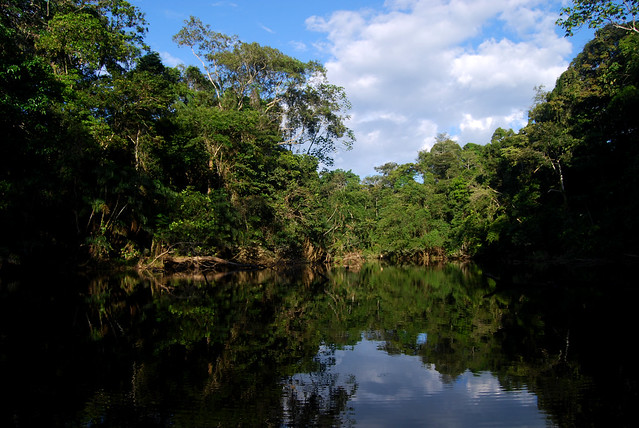Before I even had this blog, I was writing about an awesome idea that could have redefined how we approach sustainability trade-offs. The story is about the Yasuni National Park in Ecuador, a vast space of virtually untouched rain forest under which large oil reserves had been found.

Image by Geoff Galice, via Flickr CC.
The Ecuadorian government being the Ecuadorian government (the same one that added the right to food and animal rights to its constitution), it treated this discovery in a novel way, turned to the international community and said this: “We don’t want to destroy this pristine piece of rain forest that helps absorb carbon, regulate atmospheric temperature and serves as an ecosystem to millions of species. We are ready to give up half of the expected net worth of the resource if you supplement the other half so that we can combat poverty in our country.” This, to an economist, sounds like a really fair deal because we are used to thinking about “opportunity costs”, i.e. the costs of not doing something as compared to doing it. In not drilling, the Ecuadorian government is giving up the income it could have gotten from the oil, so asking for half of that amount back makes economic sense.
Unfortunately, the world didn’t think so (I particularly like the title of the article too: “Ecuador to World: Pay Up to Save the Rain Forest. World to Ecuador: Meh.”).
After setting up a fund overseen by the UNDP, government officials traveled the world trying to convince other governments, aid agencies and the like of the value of keeping Yasuni untouched. As one reporter noted, this is tricky because it can quickly sound like holding the rain forest hostage – “give me the money or I’ll shoot the trees!” However, in my mind this is different precisely because that is the choice that a poor country like Ecuador often faces.
In the end, not enough money came together to warrant a continued embargo on drilling, and so President Correa made what he described as one of the most difficult decisions of his presidency:
“The real dilemma is this: Do we protect 100 percent of the Yasuní and have no resources to meet the urgent needs of our people, or do we save 99 percent of it and have $18 billion to fight poverty?”
The issue with this statement, though, is that even to drill in only 1% of the forest you need to build roads and set up facilities that will almost automatically open up the possibility of future expansion. Furthermore, human intrusion, noise, run-offs and pollution of the drilling activity etc. will inherently damage the ecosystem in a myriad of ways.
Environmental groups in the country are rallying to collect signatures to keep the plan – which had been widely popular – alive by forcing a national referendum.
This development sets up the original questions that environmental economics tries to deal with in a very acute setting – what is the value of the environment that allows us all to thrive? Who should sacrifice short-term needs to protect it? Can we make a trade-off between human needs and environmental destruction? And should there be a global solidarity in these questions, especially if poor countries have to make these choices?
I was alerted to this originally by a Planet Money podcast episode, and they rebroadcast it with an update on the latest developments here. It gives a great introduction to the topic and the difficulties attached to it. Listen to it here!
Reblogged this on Shared Harvest and commented:
I have been following this blogger for a few months now and she makes some very interesting observations.